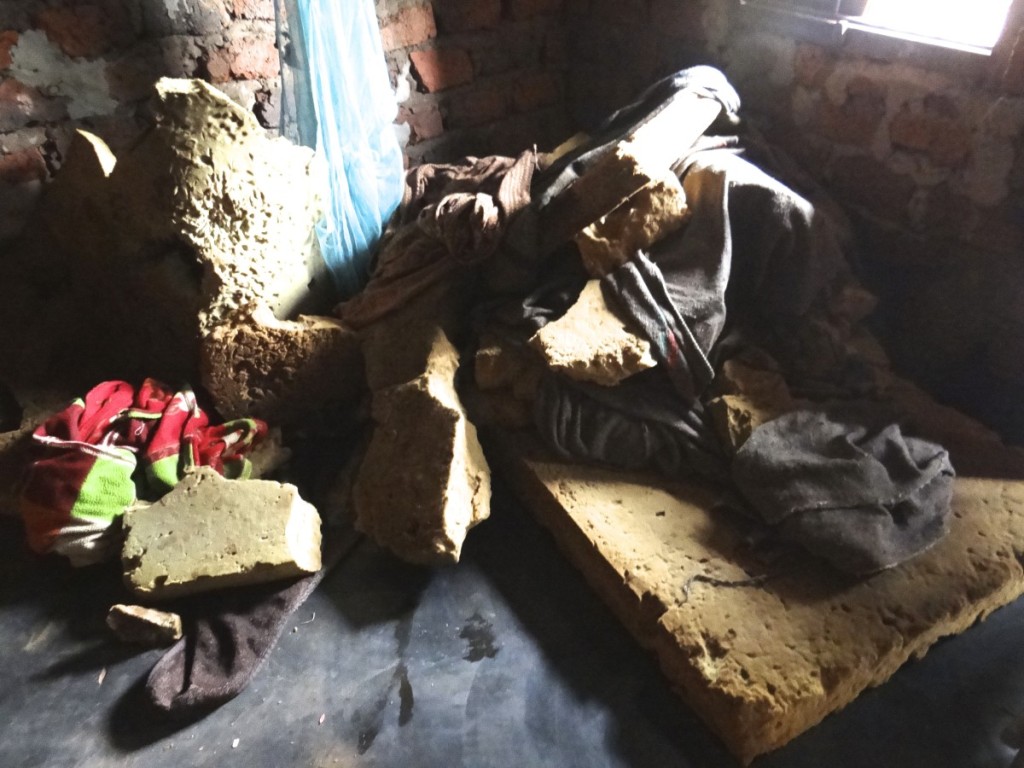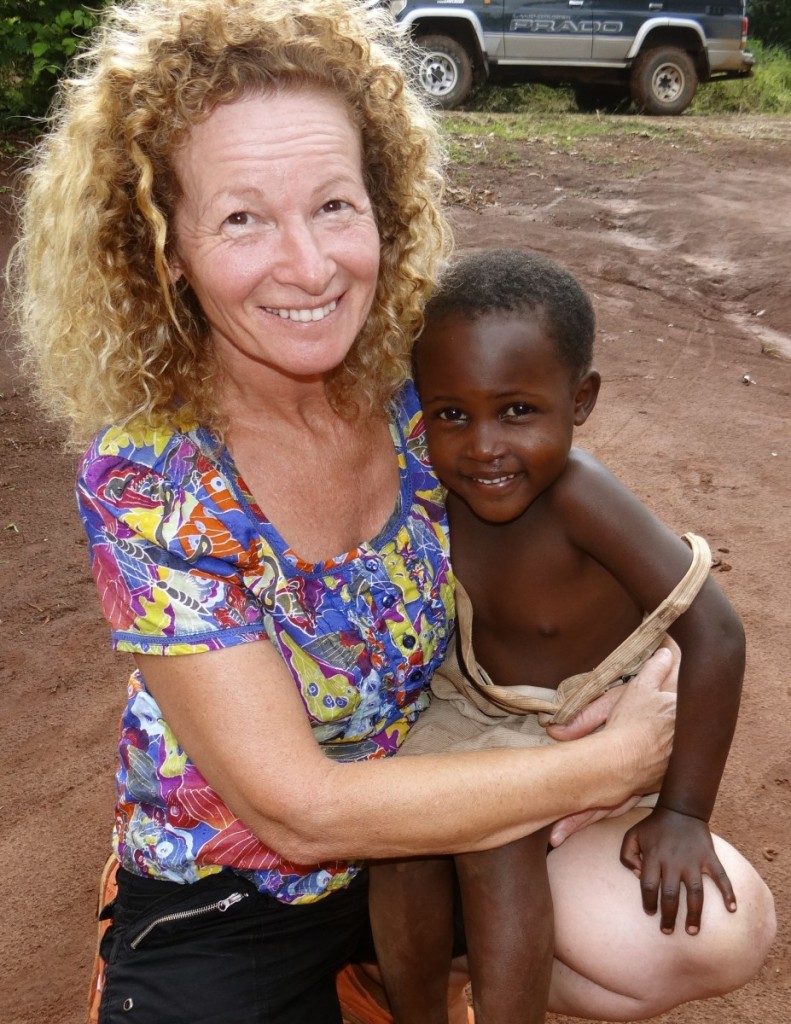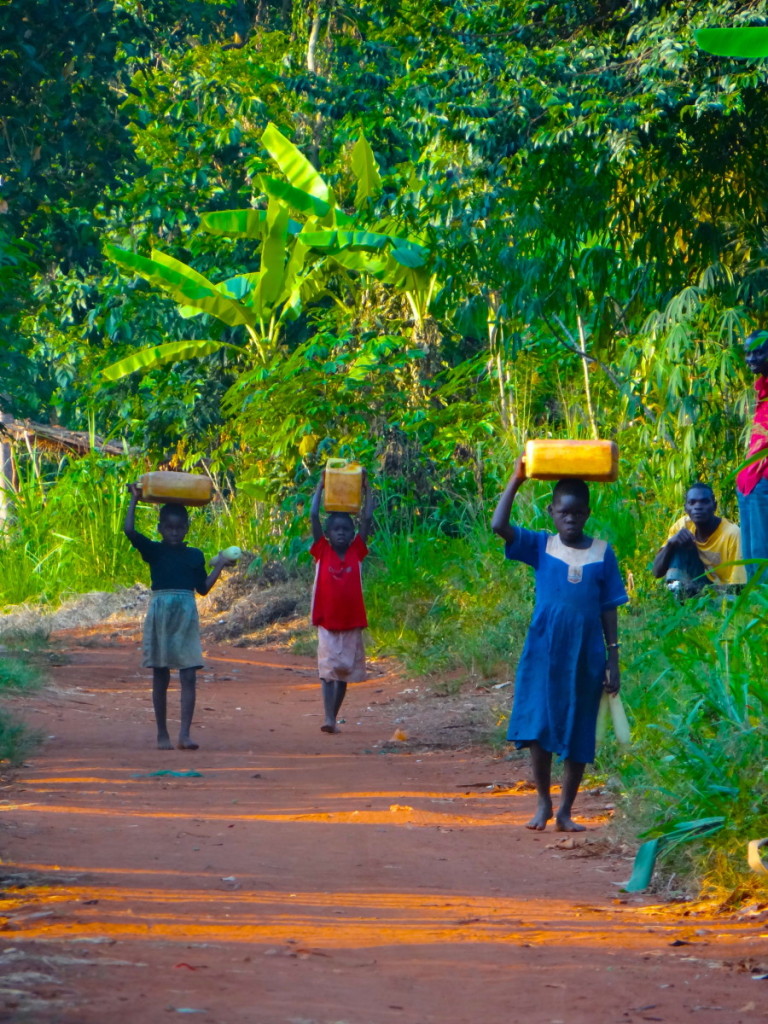We have gone from splendid sophistication to squalor slums of Uganda
Outside, the African night sang a loud melody with the sound of night birds and insects. As I lay tented within my mosquito net in a metal frame bunk bed, I thought how much my life had changed in just one month.
Left behind is the glitz and glamour of many parts of our past 3 years of world travels, staying and reviewing amazing hotels and resorts as a travel writer in many of the 57 countries we have visited so far.
I’ve washed off the day’s grime from visiting the local mud huts, and have crawled into my little ‘insect proofed’ haven, and as I do, a smile comes across my face.
As tough as today has been, it has also been incredibly rewarding.
So let me tell you why.
Our day starts at 6:00 a.m. as Explorason eagerly prepares himself for school.
I walk down the hill to listen and stood as the children sung at school. Slowly a few of the young ones had gathered around me, as my arms steadily extended wider and wider to include more of these ‘love-starved’ children in my embrace.
I was pinned against the wall with cuddles and hugs, as an increasing number of “Mudugav” (native Ugandan) youngsters wanted to share the warmth of a “Muzungu’s” (Caucasian) affection.
As I stood trapped in a sea of brown arms, I felt one little girl slowly pulling upwards my individual blonde forearm hairs; examining each one in fascination.
Then – YANK – she systematically plucked hairs one by one from my arm after each examination!
To me, this was so funny, even if slightly painful. But to her, she had never seen blonde hair on an arm, and I was fascinating!

Other young ones gently rub my white arms – up and down, feeling the softness which is so different in color, and a novel experience to these youngsters.
Explorason has been the first white “Muzungu” boy these “Mudugav” children had ever seen. Some days he was overwhelmed by the attention. On other occasions, he struggled to understand their English.
It was as though two worlds were coming together. Their world, and ours.
Uganda’s population has over 80% that live below the poverty line. A huge proportion of these inhabitants dwell in squalor and filth, and often with not enough food or nutrition. Many are suffering from medical illnesses and diseases, including a growing increase in HIV.

Why are we here, and who are we here with?
In the Field Ministries (ITFM) is a very small ‘not for profit’organization, that has been established by an American couple who have been coming to Uganda for decades.
These two people raised enough money to buy 26 acres of land in 2011, drilling a deep well for the villagers to access clean water.
In just four years through private donations only ITFM have built: a medical centre, seven school classrooms, lunch shelter with kitchen, sports and play areas, teacher housing, animal shelters, garage, contractor housing, volunteer team housing, vegetable gardens, and two amenity blocks – all in a fenced and gated compound.
So, this afternoon we venture out to the extremely impoverished homes of the students we have identified at school as being the ‘most needy of the needy’.
And I must say, what we saw has shocked me!
Increasingly we discover that a high percentage of these children are being raised by their grandparent/s, or in the Lugandan language, ‘Jjaja’s’.
Dumped or deserted in many cases by their biological parents, (and in some cases, the parent had died, or may have become too ill to care for them). Often the ‘Jjaja’ was left to rear as many as 8 or more children, coupled with failing health and diminishing vision. Sometimes we even found the task was left to the great grandparents.
We heard one man has fathered 18 children with many wives, but each wife is left responsible for the children’s wellbeing and education she gave birth to, and he simply deserted them, without a care. One man has three wives, and leaves them the property and refuses financial help this is common. Other children are often left when the wife gets a new ‘husband’ and to avoid child neglect or abuse, the child is left with a neighbor or family member.
So today, as we interviewed some of these families we heard sad story after story.

Kimberly, one of the leaders of ITFM, had an amazing checklist she uses when we are visiting their homes. Some of the things we would check included the following:
-To see if the child was in any danger, or being harmed.
– If the children are being fed at home, what food if any is offered, and at what nutrition level?
– Did they have a mattress?
– Was there even a blanket?
– Is the house inhabitable; the level of squalor, and does the roof leak etc.
– Did the caregiver have any income, and if so, how was the family surviving?
The missions 4WD vehicle drove us from house to house, and at times we left the vehicle and walked through bush and crop fields to find a home.

I was appalled at some of the conditions we found.
One of the first homes I was to see inside revealed a young lady sleeping on a putrid grey old piece of foam, on the mud hut floor. This was her bed and I daresay it was shared amongst the family.
But with each visit, the living conditions seemed to get progressively worse.
We soon discovered infants, youths, and adults who only had broken old bits of foam to sleep on.
Others had no mattresses, and at times, and only an old filthy rag to sleep on.
There was no mosquito net, and no blanket to keep the evening chill off.
I think the worst was a ‘Jjaja’( who we think liked a little too much of the local homebrew), whose house was filled with fleas brought in by the rats and chickens, as rotten pieces of food scraps littered the floor. These fleas or mites bit us both.
(We dread to think what bugs were in that home, and made our skin itch even after we went home and had the hottest shower, and clothes were boiled.)
There were no mattresses or foam for the six children she cared for as they must have huddled together in one room, and the rusted old tin roof showed large areas of light that shone through from the sun. This must be a damp and cold room filled with a muddy pool of water when the rains come flooding in – straight onto the children as they sleep.
Even the outdoor kitchen was a crumbling old mud brick remains of an alcove, with no roof.

One little girl dressed only in a boy’s singlet held my hand the entire time we were there. I shooed away flies from her sores and I wiped her dripping nose, with raw scabs under it.
I have felt so helpless at times here in Uganda, but I learned there was one thing I could do. And that was to show love to these people.
So each time I saw the children, I tried to hug them; to rest an approving hand on their shoulder, or to pick them up and cuddle them if they fell and grazed their knee.
I would hold them tight, and tell them they were special, and that I loved them.
I would rub my finger softly on their cheek, or rock them on my lap, and envelop them tenderly.
Many of these children never received love. They were left alone with siblings. Toddlers and babies were found left alone for hours on end whilst the adults went off to drink or attend the field. At times cared for another child only a few years older.
Many kids found themselves at the wrong end of a drunken adult and were beaten. Other minors were simply just neglected.
On the last day of school term, I said goodbye to a group of small children who I sometimes taught songs to in their classroom. The teacher explained we were leaving, and the children replied in Lugandan that they did not want us to go.
One boy remained seated on the step after the others left.
He looked up at me, and then raced over and clung to my waist, and I embraced him with nurturing motherly love. I held him tight, and as I did, I was overcome, and I found myself crying.
It may not be easy to love the unlovely.
It is not easy to show care to a filthy dirty human.
It is not easy to hold in one’s arms those that live in the poverty-stricken slums.
Make no mistake, at times the smell, stench, and personal filth really was challenging for me.
When the burden of what I experienced around me became overwhelming, and the weight and enormity of it all came heavily upon my shoulders, I would stop and remember to take each day – one at a time.
I would stop and remember to love each child – one at a time.
I would have to put away the thoughts of the 5-Star luxury traveling life we have been privileged to experience prior to this, and I would think of those around me that smile with virtually no earthly possessions.
These beautiful people did not choose to be born into squalor.
These lovely children did not choose to be born into families that did not care for them.
It is not their choice.
But it is our choice to love them.
It is our desire to share with them the gift of love and acceptance.
“A new commandment I give unto you, that you love one another, as I have loved you” – the words of Jesus


Questions and Comments
- Have you been to Uganda?
- According to you, what should be done to eradicate poverty and hunger among the less fortunate?
- Please leave us a comment in the comments section below.
